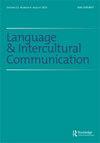保守政治话语中的身份认同工作:跨文化比较
IF 2.2
1区 文学
0 LANGUAGE & LINGUISTICS
引用次数: 0
摘要
本文介绍了对意大利和北爱尔兰宗教保守派政治家政治话语中身份定位的跨文化研究结果。研究结果表明,人们使用了家庭、信仰、自由和社会灾难的参照系。这些框架通过使用苦难的自我叙述来捍卫信仰和传统而被放大。因此,身份定位工作的一个关键驱动因素是“赌注接种”。这就是用暗示来为偏见的指控辩护。这一举动在英语中主要是“防御性的”,而在意大利语中则包含了一种更具战斗性的“他者”策略。本文章由计算机程序翻译,如有差异,请以英文原文为准。
Identity work in conservative political discourse: a cross-cultural comparison
This article presents the findings of a cross-cultural study of identity positioning in the political discourse of religious, conservative politicians in Italy and Northern Ireland. Findings point to the use of frames of reference around family, faith, freedom and societal catastrophe. These frames were though amplified through use of self-narratives of suffering in defence of beliefs and traditions. A key driver of the identity positioning work was therefore ‘stake inoculation’. That is the use of cues to defend against accusations of bigotry. This move in English is largely ‘defensive', whereas in Italian it involves a more combative strategy of ‘othering’.
求助全文
通过发布文献求助,成功后即可免费获取论文全文。
去求助
来源期刊

Language and Intercultural Communication
Multiple-
CiteScore
3.00
自引率
47.40%
发文量
50
期刊介绍:
Language & Intercultural Communication promotes an interdisciplinary understanding of the interplay between language and intercultural communication. It therefore welcomes research into intercultural communication, particularly where it explores the importance of linguistic aspects; and research into language, especially the learning of foreign languages, where it explores the importance of intercultural perspectives. The journal is alert to the implications for education, especially higher education, and for language learning and teaching. It is also receptive to research on the frontiers between languages and cultures, and on the implications of linguistic and intercultural issues for the world of work.
 求助内容:
求助内容: 应助结果提醒方式:
应助结果提醒方式:


